New Poetry Books
Thinking of completing Nicole Sealey’s Poetry Challenge (read one poetry book each day for the month of August)? Check out some of these new releases!
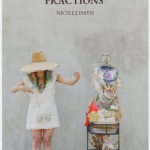 Nicelle Davis, The Language of Fractions. Moon Tide Press 2023.
Nicelle Davis, The Language of Fractions. Moon Tide Press 2023.
Nicelle Davis’s collection The Language of Fractions explores the question of whether we love wholly or only in parts. Employing found poetry, Davis raises issues of omphalophobia, love over time, missed communication, superficiality, and environmental destruction. Through her use of juxtaposing images and writing styles, Davis shows how love can be fragile and can often fail. The Language of Fractions obsesses over the question: Do we love wholly or only in parts?
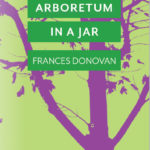 Frances Donovan, Arboretum in a Jar. Lily Poetry Review Books 2023
Frances Donovan, Arboretum in a Jar. Lily Poetry Review Books 2023
Arboretum In a Jar weaves lyric poetry with memoir, dramatic personae with careful self-reflection, all in a complex meditation on trauma, sexual awakening, recovery, and femininity. Rapunzel, Snow White, and princesses in many guises are alive in these poems, not as fairy tale characters, but as versions of the speaker’s fragmented self, as figures through which self-discovery must eventually occur.
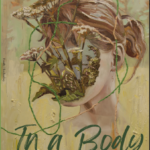 Emily Hockaday, In a Body. Harbor Edition 2023.
Emily Hockaday, In a Body. Harbor Edition 2023.
Through a feminist and ecopoetic lens, In a Body considers the ecosystem of the ill body in contrast to the ecosystems around us. In addition to themes of ecology and chronic pain, this collection touches on parenting, grief, and the urban environment. Joan Kwon Glass says: “These brief and breathtaking poems ask us to consider the ways in which both our bodies and our world betray, buoy, and surprise us, posing questions about science, love, vulnerability, mortality, and suffering.”
 Amanda Galvan Huynh, Where My Umbilical Is Buried. Sundress Publications 2023. Where My Umbilical Is Buried remembers the laughter around a game of Lotería, “cicada shells / ghosting” tree branches, Texas-shaped tortillas, and learning “numbers in English, / in Spanish.” Here, we find familial portraits scattered across small Texas towns, boots shuffling to La Reina de Cumbia in dance halls, hands “[grasping]at words” to make sense of an unforgiving world. Galvan Huynh asks us to consider the intersections of our heritage and to reflect on our mothering as it nests within our present selves. She calls us to witness the ramifications of assimilation and the inheritance of fear—how a tongue resists being “pulled away / saying grandpa instead of abuelo” and cultivates space to “envelop the Bidi Bidi Bom Bom [her]familia / sways to.” Where My Umbilical Is Buried is a threshold for acceptance and healing.
Amanda Galvan Huynh, Where My Umbilical Is Buried. Sundress Publications 2023. Where My Umbilical Is Buried remembers the laughter around a game of Lotería, “cicada shells / ghosting” tree branches, Texas-shaped tortillas, and learning “numbers in English, / in Spanish.” Here, we find familial portraits scattered across small Texas towns, boots shuffling to La Reina de Cumbia in dance halls, hands “[grasping]at words” to make sense of an unforgiving world. Galvan Huynh asks us to consider the intersections of our heritage and to reflect on our mothering as it nests within our present selves. She calls us to witness the ramifications of assimilation and the inheritance of fear—how a tongue resists being “pulled away / saying grandpa instead of abuelo” and cultivates space to “envelop the Bidi Bidi Bom Bom [her]familia / sways to.” Where My Umbilical Is Buried is a threshold for acceptance and healing.
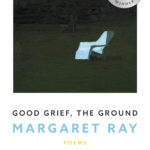 Margaret Ray, Good Grief, the Ground. BOA Editions 2023
Margaret Ray, Good Grief, the Ground. BOA Editions 2023
Selected by Stephanie Burt as the winner of the A. Poulin Jr. Poetry Prize, Margaret Ray’s Good Grief, the Ground interrogates the everyday violences nonchalantly inflicted unto women through personal, political, and national lenses. Moving between adolescence and adulthood, Ray alternates between dark humor and heart-wrenching honesty to explore grief, anxiety, queer longing, girlhood, escape from a bad marriage, and the mess of tenderness, darkness, and animosity. In the words of Stephanie Burt: “Come and see. Take care. Dive in.”
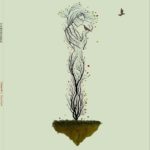 Deborah L. Staunton, Untethered. V Press 2023.
Deborah L. Staunton, Untethered. V Press 2023.
Untethered, a poetry book by Deborah L. Stauton, tells the story of growing up with a mentally ill, alcoholic father and the experience of raising a mentally ill daughter. It follows the author’s journey through multiple miscarriages and the “untethering” of minds, relationships, and pregnancies. Untethered is a testament to the resilience of the human spirit through the author’s unravelling world.
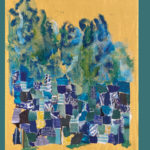 Jeri Theriault, Self Portrait as Homestead. Deerbrook Editions 2023
Jeri Theriault, Self Portrait as Homestead. Deerbrook Editions 2023
These deft, spare poems reclaim the flare of self-ness that has been tamped in women over many generations, and their fresh word-play and inventive forms make their renditions of grandmother, mother, and self-as-girl-morphing-to-elder all the more arresting. Every gesture flies off the page in its caress of language, also evoking the iconic loneliness of women in the speaker’s past and in history itself. The result? A redemptive empathy for self and ancestor, the well-earned gift of a generation of women who have paid the price of breaking free and now step forth to bear honest witness and break old patterns. Such stories cannot be told often enough. These poems do so bravely and in searingly honed phrases and images.–Leslie Ullman
See more suggestions:
July Bookshelf (fiction and memoir)
June Bookshelf (poetry)
May Bookshelf (poetry)
INTERESTED IN REVIEWING ONE OF THESE BOOKS FOR MER? PLEASE WRITE US AT [email protected].
